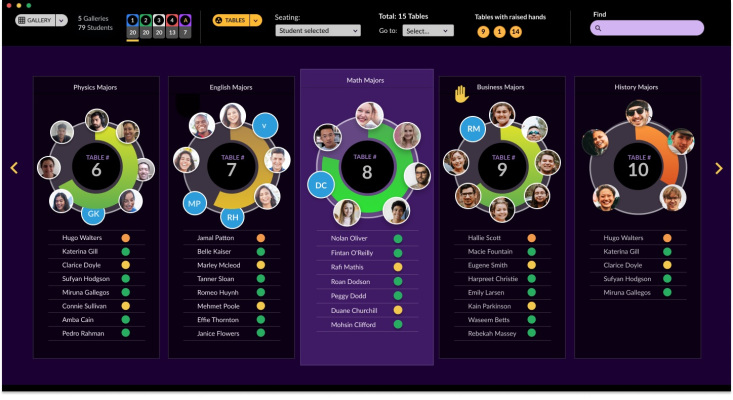Engageli nabs $33M more for its collaborative video-based teaching platform – TechCrunch

[ad_1]
As schools move more widely into reopening their doors for in-person learning, many educational institutions have also learned a critical lesson in the last year. Having better tools to teach remotely are critical for situations when the physical experience has to be shut down, but even when things are “back to normal”, better tech can still enhance what educators and students can do, and to whom teaching can be delivered. Now, a startup betting on virtual learning in higher education — and investing in the innovation to deliver that — is announcing a round of funding as it continues to expand its business.
Engageli, which has built an online teaching platform from the ground up — providing not just its own built-in-house video technology to deliver lectures and enable conversations, but tools to enable students to “sit” in study groups to work together and features to share and annotate lecture notes, take quizzes and more — has picked up $33 million in funding.
CEO Dan Avida — who co-founded the company with his wife Daphne Koller (the Coursera co-founder) and Serge Plotkin — said the startup will be used to continue building more tools and scaling its platform and opening it up to more schools, specifically the bracket of higher learning colleges and universities that it targets as customers, as these institutions continue to embrace the promise of better video tools both for delivering live lessons and also to develop more on-demand and other features around Engageli’s video platform.
“At first the priority was on the best synchronous experience,” Avida said in an interview, of the priorities of universities when it came to remote learning. “Now everyone is much more focused on multi-modality.”
The funding, a Series A, is being co-led by Maveron and another (unnamed) investor and also includes participation from Corner Ventures, Good Friends, Educapital and what Engageli describes as several “prominent individual technology executives.”
Notably, the funding is coming only seven months after the startup first emerged from stealth in October 2020, and investors from the $14.5 million seed round that it announced at the same time are also participating. The startup has now raised more than $47 million and is not disclosing its valuation.
While there are now dozens, maybe even hundreds, of tools to help students learn things without being inside a traditional classroom, Engageli has taken a slightly different approach from the pack by building its video-based platform from the ground up, with educational aims in mind.
This is already a step change, when you think about it, from the likes of Teams from Microsoft, Google Classroom or Zoom. These are three of the most commonly used video platforms in educational settings, but they are all based on technology that was, essentially, originally built with more enterprise and generic purposes in mind.
From this, Engageli has worked on expanding the platform with tools that enhance not just the video experience, but enhance it in ways that make sense for educators and learners — that is, tools that are intuitive to use for those teaching and studying.
Up to now, these have focused on both the kinds of conversations that students can have with each other and the teacher, and ways for the teacher to keep their students engaged, by way of quizzes, notes that they can download and annotate and Q&A channels. For now, Engageli is focused on building its own technology, but over time you can see how the platform might open up to link up with bigger learning management systems and the other tools that institutions might already be using regularly.
Avida said that Engageli is not yet disclosing any metrics on engagement time, customer or user numbers or any other figures. For now, he said the startup is picking up university customers across the U.S., in the U.K. and Israel (from where the founders hail and all originally cut their tech teeth in the country’s military units), where classes are already handling up to “hundreds” of concurrent students.
He also added that even as more schools return to in-person learning, he is expecting a boost of new users in the fall quarter because the genie, so to speak, is out of the bottle with remote learning and the fact that it can continue to be effective.
“Even before the pandemic there were tens of millions of students online, half of all students were taking some form of online course, and we expect this to go much further, not unlike online grocery or telemedicine,” he said. “One professor described it to me like this: ‘The trough of disillusionment” — a reference to the Gartner Magic Quadrant visualization — “is very shallow here. We ain’t going back’.”
This is also a sentiment that educators also seem to be picking up.
“It’s hard to go back once you raise the bar on engagement. With Engageli, I felt the experience was the most like a real classroom. Students are sitting at tables, I can quickly see what they are doing, they can ask others at their table questions, they are chatting and interacting,” said Dr. Theodora Christou, a professor at Queen Mary University of London, in a statement. “I finally have an easy way to lead meaningful group work and case studies online. I would choose Engageli over any other existing tool that my university offers.”
The company’s funding and growth come at a time when we’re indeed seeing a wider wholesale adoption and development of more tools to accommodate digital modes of learning, in many cases also to complement what is happening offline, and also in younger age groups, too.
Just in the last week, Kahoot acquired Clever in the U.S. to bring on a popular platform used by many K-12 schools to manage their online learning interactions, and yesterday StuDocu raised funding for a platform that crowdsources, rates and shares university class notes, a platform that has now passed 15 million students and is growing very fast. All of these spell higher expectations for better technology in the future, something Engageli will also be hoping to engage.
“Dan Avida and his team at Engageli, that includes professors, talented technologists and accomplished ed-tech executives, are uniquely suited to building a digital education solution that actually feels like a classroom and functions even better than some in-person courses,” said Jason Stoffer, partner at Maveron, in a statement. “Pandemic or not, every school needs Engageli to drive better outcomes for students, whether they’re taking remote classes full time or opt to tune in digitally when they need the flexibility. We’re passionate about leveling the playing field in higher education, and Engageli’s unique platform will help institutions reach and support the needs of every type of student.”
[ad_2]
Source link






